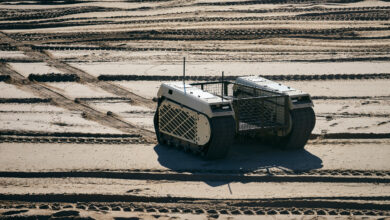DARPA to Field Test Autonomous Military Off-Roader
The Pentagon’s Defense Advanced Research Projects Agency (DARPA) is set to field-test autonomous technology on military off-road vehicles in March.
Last year, the agency selected Carnegie Mellon University, NASA Jet Propulsion Laboratory, and the University of Washington for phase 1 of the Robotic Autonomy in Complex Environments with Resiliency (RACER) program.
The program seeks autonomous technologies that “enable unmanned ground vehicles to maneuver in unstructured off-road terrain at the limit of the vehicle’s mechanical systems and at, or beyond, human-driven speeds and efficiencies.”
Field Testing
The selected teams will demonstrate “platform-based autonomy”— which they have been developing on DARPA-provided vehicles — at the first RACER-hosted field experiment, which involves navigating up to five kilometers of complex terrain.
The self-driving vehicles, based on the Polaris RZR S4 1000 platform, are equipped with “360-degree range and image sensing such as multiple LIDARs (Light Detection and Ranging), stereo camera pairs, color and infrared imaging cameras, RADAR, event sensors, and inertial measurement sensing.”
It also has an “environmentally protected, shock/vibration proof, and thermally managed Electronics Box” containing multiple graphical processing units.
Vehicle for Army, Marines, and Special Forces
Program manager in the DARPA Tactical Technology Office, Stuart Young, said that “RACER is intended to disruptively advance the integration and fielding of autonomy for robotic combat vehicles into the Army, Marine Corps, and Special Forces communities.”
The program has also awarded Duality Robotics and Intel-Federal contracts “to develop simulation environments and capabilities to enable the development of off-road autonomy algorithms.”












